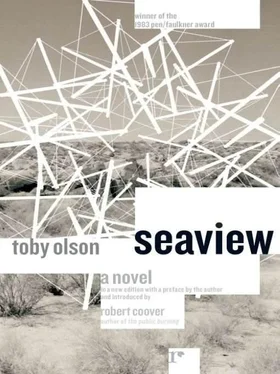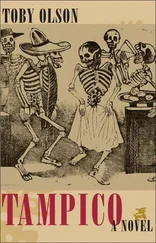He bought her a pair of warm socks. She read many books. She seemed to be waiting for something other than her death. He took her to a baseball game in a small town in southern Arizona. They did not travel much on the super highways, and he drove slowly. He liked the way she dressed herself with such care. He bought a gun. He liked the smell of the medicine bag. She bought herself a thimble after she had pierced her finger with a needle and it would not heal. He bought himself bright-yellow cheap headcovers for show. She had some trouble when she swallowed. He liked the way she was lighter each time he lifted her up. He bought her a stuffed stocking with the smile of a fat snake sewn into it for the small of her back. He told her stories of adventure and other details about golf. He told her stories about his childhood. She told him about the way sand drifted along the Cape. He bought her a music box the size of a matchbook. She liked the seriousness in his eyes when he was studying. He read very little, but he went over books in his mind. She bought him range balls at a market. She was pleased that he liked it that she was finally reading Moby-Dick . He liked the way she understood the behavior of other people. She liked the way he sweated when he made love to her. She was no longer curious about his secrets. He felt she had no secrets.
She thought of his psychological insides as a series of mystery boxes, some transparent, others only half opened, the rest opaque and totally closed, shut off from his entrance completely. He was strong on the complexity of details. He rolled his eyes and laughed with her when she told him about his boxes. She liked the ways in which she had become physical with the cancer. He bought her books about the Indians of the Southwest. They both stopped taking each other so much for granted.
She bought him a Coltrane tape, Meditations . He took her to see a pottery exhibition and found he was moved by it. He liked the way she liked to bathe in the dark. She thought seldom about the other possible men, lost days, and her lovers (so many years ago) back East; it’s all right, good-by and no regrets. They walked short distances some evenings, but like young lovers or old people. She appreciated his sadness when he was sad; she left him alone with it, realizing it was proper and necessary. He was taken by the hardness of copper jewelry against her vulnerable skin. She liked the way, in her memory, he put a small red boat out from a dock. They talked about the congruence of their traveling dreams.
IN THE TWENTY YEARS OF INCREASED EXPANSION INTO the foothills, the javelinas had for the most part kept out of sight. Still working the Catalina range, those distant mountains that turned red in the sunset to the pleasure of the rich who had built on the other slope of the wide low valley in which the city sat, they had grown thin and increasingly vicious in that spare, high country. When they did come down, visibly, into the foothills, their packs were smaller, usually no more than thirty in number, and they usually came in quick raids, hitting the cultivated cactus and the feeble gardens of those who lived highest up in the hills. They weren’t a problem if they weren’t stirred up. On a few occasions they had killed dogs who had tried to attack them. They could run quickly for short distances. There was a time when people ate them; they had been thought a delicacy when they were healthy and fat. It is doubtful if the rich who now lived there would ever have eaten these small wild boars. They were not numerous enough to be an embarrassment to the developers; they had become an instance of local color. Bob White thought he’d like to see some of them. He also wanted to see about getting a few rattlers.
Melinda had slept well and was feeling stronger. The cancer was taking a break, was the way she thought of it. Neither she nor Allen thought that the Laetrile had anything to do with it. They had stopped at a motel at the mouth of the valley before entering the city itself. The only available room had twin beds in it, and Allen thought that this had in part accounted for Melinda’s good sleep. Bob White had demurred at the offer of sharing the room with them. He had slept in the car, said he would like being able to see the road and the lights. The three of them had coffee in the room, and Bob White had told them a couple of stories, one about his childhood, the other about hunting rattlers. Melinda had found pleasure in the stories. She liked the childhood one most. Its message was conventional, and she felt she had heard the story, or some version of the story, before. But he had a way of telling it that was both ritualized and personal, and added to that was the humor he brought to it, a humor that joked both on the form of the telling and, in a very sweet and wise way she thought, on the trials of growing up. She thought this humor could have some application to what she was doing as well. And Allen had liked the story also.
Bob White said he would like to be let off near the foothills; he would like to use the gunny sack the golf balls were in.
They had laughed some at trying to figure what to do with the balls. Finally, they had decided to put them in the bottom of the shower stall. Allen had taken his shower among them. Melinda said she would stay and read, would order some lunch at the pool, would spend the day relaxing. He said he would call her around noon. He and Bob White drove off at nine.
When he dropped him off at the crossroad at the bottom of the foothills, Bob White immediately began walking. As he turned the car around, he saw him turn and stick his thumb out to the first two cars that passed him. He drove to the parking lot of a supermarket a few blocks away. The lot was already half full, and he parked between two cars. He got out, opened the trunk, and transferred the four clubs he had used the day before into his own brown-and-white vinyl golf bag. He folded the limp Sunday bag and stuck it in the left wheel well. He checked the larger golf bag, the small zipper compartment, to see that he had enough balls and tees. Satisfied, he got back into the car and drove out of the parking lot.
He thought three of the six courses in the Tucson area were possible. One was a public course, and he only toyed with trying that one for a moment. One of the others seemed good, but when he checked its location on the map he saw it was close to a retirement section of the city, and he decided against it. The third was called Tucson Hills. It was a par-seventy, sixty-three-hundred yard course, and it was rated as having average difficulty in Golf Digest . It was located fairly close to the residential areas that were in turn close to the professional and business complexes of the city.
At the entrance, a few yards in from the blacktop road, was a crushed-stone drive with a wooden archway at the foot of it. Hanging from the crosstie was a piece of wood that swung free on screw eyes and woodburned into it were the words: Tucson Hills Country Club ( Private ). He passed under the sign and along the drive, which was lined with a hedge high enough that from his car he could not see beyond it. The drive went on for a quarter-mile, and when the hedge ended, it opened up onto a crushed-stone parking lot to the left. At the end of the parking lot was a low rectangular building, adobe, in the Spanish style, with a red tile roof. There were three archways, equally spaced, in the side of the building, and above each was a sign: Restaurant, Patio, Pro Shop . He parked and walked across the gravel through the archway marked Patio and into a space open to the sky in which there were a few metal picnic tables with umbrellas in the middle of them. At the left end was a bar that led both into the patio and the restaurant on the other side of it. Three men sat on stools on the patio side of the bar with their backs to him, and facing him was a man in a white jacket behind the counter. The man looked at him curiously as he entered. He paused for a moment, then walked to the right through the open courtyard to a screen door with a small sign above it: Pro Shop & Office. He opened the screen door and entered. The pro shop was large and carpeted in green.
Читать дальше












